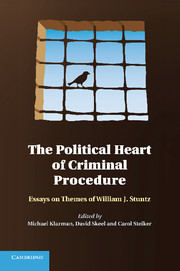Book contents
- Frontmatter
- Contents
- Contributor List
- Introduction: Appreciating Bill Stuntz
- Part I The Political Economy of Substantive Criminal Law
- Part II Police Investigations
- Part III Emotion, Discretion, and the Judicial Role
- 9 Two Conceptions of Two Conceptions of Emotion in Criminal Law: An Essay Inspired by Bill Stuntz
- 10 Patrolling the Fenceline: How the Court Only Sometimes Cares about Preserving Its Role in Criminal Cases
- 11 Three Puzzles in the Work of Bill Stuntz
- 12 The Mercy Seat: Discretion, Justice, and Mercy in the American Criminal Justice System
- 13 Epilogue: Three Underrated Explanations for the Punitive Turn
- Index
11 - Three Puzzles in the Work of Bill Stuntz
Published online by Cambridge University Press: 05 March 2012
- Frontmatter
- Contents
- Contributor List
- Introduction: Appreciating Bill Stuntz
- Part I The Political Economy of Substantive Criminal Law
- Part II Police Investigations
- Part III Emotion, Discretion, and the Judicial Role
- 9 Two Conceptions of Two Conceptions of Emotion in Criminal Law: An Essay Inspired by Bill Stuntz
- 10 Patrolling the Fenceline: How the Court Only Sometimes Cares about Preserving Its Role in Criminal Cases
- 11 Three Puzzles in the Work of Bill Stuntz
- 12 The Mercy Seat: Discretion, Justice, and Mercy in the American Criminal Justice System
- 13 Epilogue: Three Underrated Explanations for the Punitive Turn
- Index
Summary
In this essay, I explore three puzzles in the work of Bill Stuntz. I do not have complete solutions for any of them. Still, my hope is that my effort to think them through will provide some insights into the writings of this remarkable scholar and human being.
The first puzzle is this: Stuntz argued passionately and effectively that Christians should “come out of the closet” and bring their Christian perspective to bear on legal problems. It is true that in his writings making this argument, he sometimes drew on examples from the field of criminal justice, his primary academic interest. However, at least to my knowledge, his work focusing on criminal justice nowhere explicitly invoked his Christian commitments. Why did Stuntz decline to take his own advice?
- Type
- Chapter
- Information
- The Political Heart of Criminal ProcedureEssays on Themes of William J. Stuntz, pp. 200 - 211Publisher: Cambridge University PressPrint publication year: 2011

